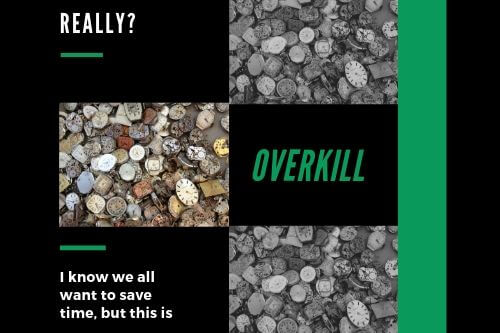
YouTube / iTunes / Spotify / Radio Public / Pocket Casts / Google Podcasts / Breaker / Overcast
Listen to ArtisanEnglish.jp posts & lesson intros here.
Word of the Day: Overkill
There’s something about us humans which wants us to collect stuff.
To a certain extent, it’s OK, but collect too much, and it soon becomes overkill.
Overkill occurs when you have too much of something—more than you can use. Whatever you have loses its effectiveness.
I’m trying to say that once you collect too much of something, you have more than you could ever need or use.
Whatever you’re collecting loses its effectiveness and starts to become junk.
As I mentioned earlier, we’re all collectors.
The question is, at what point does what we collect cease being a hobby, which we participate in for enjoyment, and become problematic?
People collect everything from books to antique cars.
I have a collection of more than 400 books, many of which are yet to be read.
Some of you reading this post may say that’s overkill.
We only read most books once, if we’re lucky.
There are times when we pick up a book we intend to read only to discover we don’t like it.
We put it back on the shelf, and it sits there, doing nothing, gathering dust.
Well, it’s only overkill if the collecting becomes problematic.
My books are neatly arranged on shelves.
I own my own home, and I have ample space.
Nothing is in the way, and there’s no problem, hence no overkill.
Not everyone can say that, though.
Many people, you may know one or two, live in tiny homes but have extensive collections of clothing that spill out of their closets and into living areas.
Others have entranceways cluttered with pairs of sneakers or umbrellas.
Clutter is a problem.
When stuff begins to get in the way, your lovely collection may have shifted to the overkill department, and you may want to consider calling Marie Kondo.
Everything you have may spark joy, but too many sparks, and you may set your house on fire.
Remember, collecting things is natural.
Try to keep it from getting out of hand and spilling over to become overkill.
Flesch-Kincaid Readability Test
This post is understandable by someone with at least a 7th-grade education (age 12).
On the Flesch-Kincaid reading-ease test, this post scores 74.
The easier a passage is to read, the higher the score on a scale of 0 – 100.

